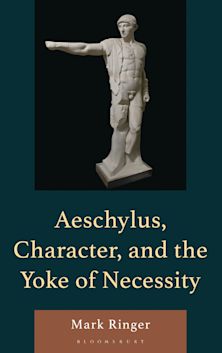- Home
- ACADEMIC
- Philosophy
- Ancient Philosophy
- The Revival of Platonism in Cicero's Late Philosophy
The Revival of Platonism in Cicero's Late Philosophy
Platonis aemulus and the Invention of Cicero
The Revival of Platonism in Cicero's Late Philosophy
Platonis aemulus and the Invention of Cicero
This product is usually dispatched within 3 days
- Delivery and returns info
-
Free US delivery on orders $35 or over
You must sign in to add this item to your wishlist. Please sign in or create an account
Description
Less than two years before his murder, Cicero created a catalogue of his philosophical writings that included dialogues he had written years before, numerous recently completed works, and even one he had not yet begun to write, all arranged in the order he intended them to be read, beginning with the introductory Hortensius, rather than in accordance with order of composition. Following the order of the De divinatione catalogue, William H. F. Altman considers each of Cicero’s late works as part of a coherent philosophical project determined throughout by its author’s Platonism. Locating the parallel between Plato’s Allegory of the Cave and Cicero’s “Dream of Scipio” at the center of Cicero’s life and thought as both philosopher and orator, Altman argues that Cicero is not only “Plato’s rival” (it was Quintilian who called him Platonis aemulus) but also a peerless guide to what it means to be a Platonist, especially since Plato’s legacy was as hotly debated in his own time as it still is in ours. Distinctive of Cicero’s late dialogues is the invention of a character named “Cicero,” an amiable if incompetent adherent of the New Academy whose primary concern is only with what is truth-like (veri simile). Following Augustine’s lead, Altman reveals the deliberate inadequacy of this pose and argues that Cicero himself, the writer of dialogues who used “Cicero” as one of many philosophical personae, must always be sought elsewhere: in direct dialogue with the dialogues of Plato, the teacher he revered and whose Platonism he revived.
The Revival of Platonism in Cicero’s Late Philosophy: Platonis aemulus and the Invention of Cicero is a must read for anyone working in classical studies, ancient philosophy, ancient history, or the history of philosophy.
Table of Contents
Introduction: Cicero as Platonis aemulus
Part 1: The Foundations of Cicero’s Platonic Revival
Chapter 1. Cicero’s Platonic personae and the Problem of De legibus
Chapter 2. Augustine’s Hortensius and the Invention of “Cicero”
Chapter 3. Self-Contradictory Skepticism in the Academica
Chapter 4. The Limits of Stoicism and Tullia’s Shrine in De finibus
Part 2: The Literary Fruits of Cicero’s Platonism
Chapter 5. Womanly Humanism in the Tusculanae Disputationes
Chapter 6. Phaedo and Timaeus in De natura deorum
Chapter 7. Interpreting Plato’s Dreams in De divinatione
Chapter 8. Epicurus, Chrysippus, and Homer in De fato
Chapter 9. The Ciceronian Renaissancein De senectute and De amicitia
Part 3:Cicero’s Platonism in Action
Chapter 10. Returning in Topica, De officiis, and the Philippics
Chapter 11. Brutus as Funeral Oration.
Chapter 12. Ending with Orator.
Bibliography
Product details
| Published | May 09 2018 |
|---|---|
| Format | Paperback |
| Edition | 1st |
| Extent | 331 |
| ISBN | 9781498527132 |
| Imprint | Lexington Books |
| Dimensions | 9 x 6 inches |
| Publisher | Bloomsbury Publishing |
About the contributors
Reviews
-
In conclusion, Altman has written an innovative book that uses close readings of Cicero and careful attention to his reading of Plato to challenge a number of orthodoxies and to push to see new elements of Cicero’s thought. . . This book will be valuable not solely to scholars of Cicero but anyone interested in intellectual history, as Cicero is one of the missing steps between Plato, Aristotle, Hellenistic Philosophy and Modernity.
POLIS: The Journal for Ancient Greek Political Thought
-
This is a book fizzing with energy, and full of learning of many sorts, from which any discriminating reader stands to gain.
Classical Review
-
Altman’s essays, as he explores Cicero’s hidden and open Platonism, are as engaging and stimulating as one might imagine. Few if any contemporaries have read as widely and deeply in Cicero’s writings. With objectivity but no pretended scholarly detachment, he brings his immense erudition to his personal engagement of Cicero. He finds himself in awe at Cicero’s integrity and achievement as a thinker, writer and political leader. We and our modern republics, he rightly concludes, are much in need of a properly understood Cicero.
Walter Nicgorski, University of Notre Dame



































